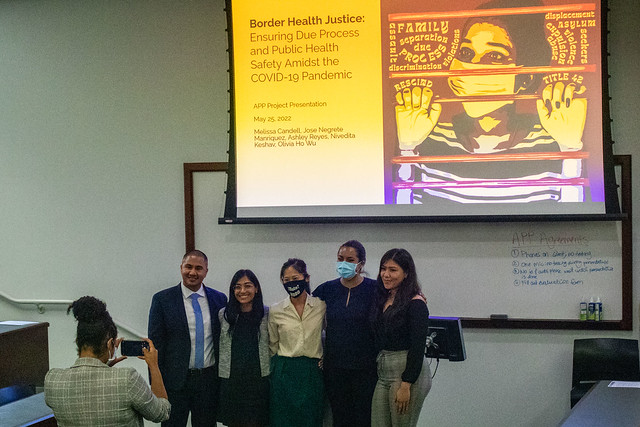By Mary Braswell
When Sophia Li decided to apply to graduate school to pursue her interest in health policy, she could not have known that the field would soon be upended by a protracted global health emergency.
Along with most of her peers in the UCLA Luskin School of Public Affairs’ master of public policy program, Li began her studies in September 2020, when COVID-19 had already taken more than 1 million lives worldwide and the arrival of vaccines was still months away.
When the time came to embark on the public policy program’s exacting capstone project, Li chose to focus on an inequity brought into sharp focus by the pandemic: As they isolated in their homes, more people turned to telemedicine for their health care needs — but that option was not available to people who lacked computers, smart phones and internet service.
“The pandemic really did shine a light on the possibilities that telemedicine brings,” Li said, “but it also showed that, while the upper half are benefiting from this, what does this mean for the lower half that have these barriers to access?”
Li was part of a team that explored this question on behalf of their client, the nonprofit Community Clinic Association of Los Angeles County. On an evening in May, Li and teammates Stacy Songco, who is earning a master of public policy and a doctorate in medicine, Xinyuan Qi, Ziyi Wei and Yixuan Yu boiled down a year’s worth of policy research and analysis into a 20-minute summary.
They were among nearly 70 second-year students to complete 15 applied policy projects this year, a rite of passage before receiving their UCLA master of public policy degrees. The capstone projects challenge students to find solutions to real-life policy dilemmas on behalf of clients in Los Angeles, across the state and nation, and around the world.
Networking with UCLA Luskin alumni had connected Li with the Community Clinic Association, which supports 65 neighborhood clinics in underserved areas. At the time, the nonprofit was “just dipping their toes into the digital divide issue,” she said.
The team spent months speaking with medical staff, local policymakers, internet service providers and, of course, the patients themselves. The conversations took place via Zoom because of COVID restrictions, but also in person, to make sure those without the means to gather virtually would be heard.
By year’s end, the team had developed more than a dozen recommendations, including the creation of a new role of digital navigator — a clinic staff member trained to guide individuals through the often-confounding world of broadband access, as well as benefits they may be entitled to, which change from ZIP code to ZIP code.
The students proposed a mechanism to receive federal funds for this new position. They stressed that information should be provided in multiple languages, and not just online but in printable formats, for those unable to access the internet. And they quickly determined that unlocking digital doors would open up a world of services and opportunities beyond telemedicine.
One of their focus groups spoke of their experiences with the California Lifeline program, which provides discounted landline and cell phone services to low-income households. While some found it confusing, “we had one unhoused individual who said, ‘Actually, you know what? I can walk you through all the paperwork, I can talk to you about how to use this,’” Li said.
“If people from the community could tap their experiences to guide others and receive compensation as a digital navigator, imagine the possibilities.”
The project culminated in a full published report for the Community Clinic Association and a formal presentation before Luskin faculty, staff and students, including the team’s advisor, Public Policy chair Martin Gilens.
Other capstone projects completed by the class of 2022 dealt with how to protect the rights of car wash workers, whether to expand the number of seats on the Los Angeles City Council, how to balance public health and humane treatment of asylum seekers at the border, as well as homelessness, mass transit, criminal justice and more.
“It’s an immersive experience. The students value that, and the marketplace also values that,” said Wesley Yin, an associate professor of public policy and economics who has served as coordinator and advisor in the applied policy projects program.
“There’s a professionalism that makes it much more than a class project,” Yin said. “It equips students with the rich experience and knowledge to seamlessly integrate into an organization.”
Li said her team emerged with unexpected areas of expertise. “The digital divide is a really complicated issue that has everything from some little niche funding source that you need to know about, to complex infrastructure issues and these really technical things that you need to understand,” she said.
As she looks toward graduation, Li reflects on the turns in her education that brought her to this point.
She transferred from Chaffey College to UC Merced, where she earned a bachelor’s degree in public health, then managed the rigors of earning her master of public policy at a time of pandemic. Selected as a Presidential Management Fellow, Li will spend the next two years in a program that helps train young scholars to become the next generation of leaders in federal government.
“It’s been a lot of these 90-degree turns that keep putting me on the right path,” Li said. “So let’s go explore new things.”
View photos of this year’s applied policy project presentations on Flickr.


